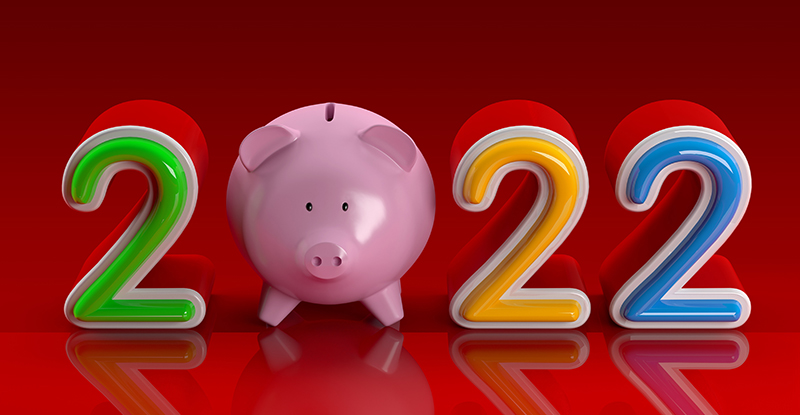
As the end of 2021 approaches, so is the time for you to review how you can reap all of your potential financial benefits from this past calendar year. And while you may not want to think about your finances over the holidays, now is actually a good time to take stock of your finances, taxes, and budget for 2022.
- RRSP
You have until March 1, 2022 to contribute to your RRSP if you want to bring down your 2021 taxes. If you haven’t maximized your RRSP, consider doing so within the first two months of 2022 and make it a habit moving forward to set regular contributions to your RRSP as you enter the new season.
According to Jeff Brown, a CPA in Ontario and the Head of Small Business Banking and Wealth Management at HSBC Canada, “Putting money aside for your savings or investment, such as your RRSP, is paying yourself first. Based on your budget, designate a certain amount of your pay cheque to your RRSP. To make it easier, you can set up a recurring transfer from your chequing to your RRSP. The only caveat is to ensure that all your contributions do not exceed your RRSP contribution limit.”
- Registered Education Savings Plan (RESP)
Remember, the deadline for contributing to a RESP for the 2021 tax year is December 31. Your contribution room is accrued each year beginning the year your child was born or the year 2007, whichever is later, and until your child turns 17.
According to Shane Schepens, CPA, CA, partner Clearline CPA, “You can contribute a lifetime maximum of $50,000 per beneficiary to an RESP. Note that the amount of annual contribution room that is eligible for the CESG is $2,500. So while you can contribute more than $2,500 a year, the 20% grant is only matched by the government up to the $2,500 per year.”
- TFSA
The maximum contribution limit to your TFSA for 2021 is $6,000. And the best time, if you need to withdraw money from your TFSA, is in December, because come January you will be able to contribute back what you have withdrawn.
Another piece of advice? Don’t treat your TFSA like a savings account.
According to Brown, “To reap the full benefits of your TFSA, you want to invest within your risk tolerance, which is the degree of risks you are willing to take on to achieve potentially greater rewards. That generally means looking at longer-term investment solutions, which include stocks, bonds, exchange traded funds and mutual funds. You should also try to have savings outside your TFSA to accommodate any unexpected expenses.”
- Capital Gains and Losses
December 31 is the deadline for capital property transactions. This is important to note if you wish to sell capital property and apply the gains or losses to your 2021 tax return. Capital property includes tangible property such as real estate, vehicles, stocks, bonds, cryptocurrencies, collectibles, and art, as well as intangible property such as patents and trademarks.
According to Bilal Kathrada, CPA, CA, partner at Clearline CPA, “Generally, if you sell this type of property for more than what you originally paid, you have a capital gain; likewise, if you sell for less than the original cost, you have a capital loss. Whatever the outcome, you are required to report all capital property sales in your income tax return. In Canada, capital gains have a tax advantage over other types of income as you’re only taxed on 50% of a capital gain.”
- Set an intentional spending plan
Hate budgets? Consider setting an intentional spending plan in 2022 and making this a new habit. According to Nelson Soh, CPA, CA, a CPA Financial Literacy Program volunteer and author of 100 Day Money Mindset Journal, “An intentional spending plan is similar to having a budget, but instead of a typical budget where you look at all the money you spend and eliminate ‘unnecessary’ spending, such as subscriptions to Netflix and Amazon Prime, I always tell people that an intentional spending plan should focus on spending on what you love and stop spending on what you don’t love.”
A good example that Soh provided in our podcast chat is that if you love enjoying a cup of latte from your local coffee shop, keep doing that, but consider cutting out spending in your life that doesn’t make you feel as happy or passionate about – perhaps a streaming subscription that you barely use.
However, if budgeting is something that works better for you, here’s a quick overview of how you can budget your finances for 2022.
- Pay off debt
Now is the time to start paying off your debt. Mounting debt can be stressful, but putting it off and letting your debt snowball is not the answer. Your debt can actually be resolved with some careful planning and the first thing to do is to pick a realistic timeframe for paying off the debt – typically within five years.
According to Andrew Smith, CPA, CA, a licensed insolvency trustee at Sands & Associates in Kelowna, you should “develop a plan of action for your debts by mapping them all out. Debt can include credit cards, lines of credit, mortgages, car loans, payday loans, utility bills, cell phone bills, personal taxes, and unpaid fines. Once you’ve identified everybody you owe and your outstanding balances to them, determine the interest rates and repayment terms. If you are unsure of all of your debt, consider requesting a credit report as it provides information on who your creditors are.”
Visit CPABC’s Financial Literacy Program page for more articles and resources to help you manage your finances.
Vivian Tse is CPABC's communications manager



